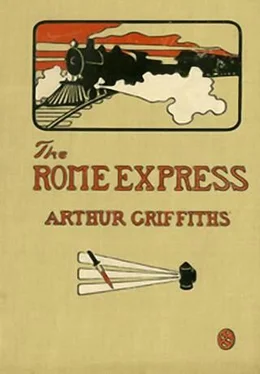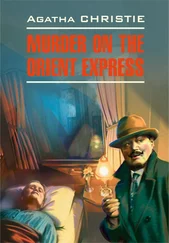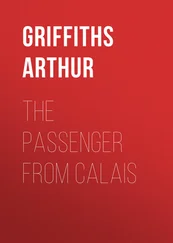Arthur Griffiths - The Rome Express
Здесь есть возможность читать онлайн «Arthur Griffiths - The Rome Express» весь текст электронной книги совершенно бесплатно (целиком полную версию без сокращений). В некоторых случаях можно слушать аудио, скачать через торрент в формате fb2 и присутствует краткое содержание. Жанр: Детектив, на английском языке. Описание произведения, (предисловие) а так же отзывы посетителей доступны на портале библиотеки ЛибКат.
- Название:The Rome Express
- Автор:
- Жанр:
- Год:неизвестен
- ISBN:нет данных
- Рейтинг книги:3 / 5. Голосов: 1
-
Избранное:Добавить в избранное
- Отзывы:
-
Ваша оценка:
- 60
- 1
- 2
- 3
- 4
- 5
The Rome Express: краткое содержание, описание и аннотация
Предлагаем к чтению аннотацию, описание, краткое содержание или предисловие (зависит от того, что написал сам автор книги «The Rome Express»). Если вы не нашли необходимую информацию о книге — напишите в комментариях, мы постараемся отыскать её.
The Rome Express — читать онлайн бесплатно полную книгу (весь текст) целиком
Ниже представлен текст книги, разбитый по страницам. Система сохранения места последней прочитанной страницы, позволяет с удобством читать онлайн бесплатно книгу «The Rome Express», без необходимости каждый раз заново искать на чём Вы остановились. Поставьте закладку, и сможете в любой момент перейти на страницу, на которой закончили чтение.
Интервал:
Закладка:
"This Quadling was the only surviving partner. He was well known and liked in Rome, indeed, many who heard the adverse reports disbelieved them, I myself among the number. But my duty was plain-"
"Naturally," echoed the fiery little detective.
"I made it my business to place the banker under surveillance, to learn his habits, his ways of life, see who were his friends, the houses he visited. I soon knew much that I wanted to know, although not all. But one fact I discovered, and think it right to inform you of it at once. He was on intimate terms with La Castagneto-at least, he frequently called upon her."
"La Castagneto! Do you mean the Countess of that name, who was a passenger in the sleeper?"
"Beyond doubt! it is she I mean." The officials looked at each other eagerly, and M. Beaumont le Hardi quickly turned over the sheets on which the Countess's evidence was recorded.
She had denied acquaintance with this murdered man, Quadling, and here was positive evidence that they were on intimate terms!
"He was at her house on the very day we all left Rome-in the evening, towards dusk. The Countess had an apartment in the Via Margutta, and when he left her he returned to his own place in the Condotti, entered the bank, stayed half an hour, then came out with one hand-bag and rug, called a cab, and was driven straight to the railway station."
"And you followed?"
"Of course. When I saw him walk straight to the sleeping-car, and ask the conductor for 7 and 8, I knew that his plans had been laid, and that he was on the point of leaving Rome secretly. When, presently, La Castagneto also arrived, I concluded that she was in his confidence, and that possibly they were eloping together."
"Why did you not arrest him?"
"I had no authority, even if I had had the time. Although I was ordered to watch the Signor Quadling, I had no warrant for his arrest. But I decided on the spur of the moment what course I should take. It seemed to be the only one, and that was to embark in the same train and stick close to my man."
"You informed your superiors, I suppose?"
"Pardon me, monsieur," said the Italian blandly to the Chief, who asked the question, "but have you any right to inquire into my conduct towards my superiors? In all that affects the murder I am at your orders, but in this other matter it is between me and them."
"Ta, ta, ta! They will tell us if you will not. And you had better be careful, lest you obstruct justice. Speak out, sir, and beware. What did you intend to do?"
"To act according to circumstances. If my suspicions were confirmed-"
"What suspicions?"
"Why-that this banker was carrying off any large sum in cash, notes, securities, as in effect he was."
"Ah! You know that? How?"
"By my own eyes. I looked into his compartment once and saw him in the act of counting them over, a great quantity, in fact-"
Again the officials looked at each other significantly. They had got at last to a motive for the crime.
"And that, of course, would have justified his arrest?"
"Exactly. I proposed, directly we arrived in Paris, to claim the assistance of your police and take him into custody. But his fate interposed."
There was a pause, a long pause, for another important point had been reached in the inquiry: the motive for the murder had been made clear, and with it the presumption against the Countess gained terrible strength.
But there was more, perhaps, to be got out of this dark-visaged Italian detective, who had already proved so useful an ally.
"One or two words more," said the Judge to Ripaldi. "During the journey, now, did you have any conversation with this Quadling?"
"None. He kept very much to himself."
"You saw him, I suppose, at the restaurants?"
"Yes, at Modane and Laroche."
"But did not speak to him?"
"Not a word."
"Had he any suspicion, do you think, as to who you were?"
"Why should he? He did not know me. I had taken pains he should never see me."
"Did he speak to any other passenger?"
"Very little. To the Countess. Yes, once or twice, I think, to her maid."
"Ah! that maid. Did you notice her at all? She has not been seen. It is strange. She seems to have disappeared."
"To have run away, in fact?" suggested Ripaldi, with a queer smile.
"Well, at least she is not here with her mistress. Can you offer any explanation of that?"
"She was perhaps afraid. The Countess and she were very good friends, I think. On better, more familiar terms, than is usual between mistress and maid."
"The maid knew something?"
"Ah, monsieur, it is only an idea. But I give it you for what it is worth."
"Well, well, this maid-what was she like?"
"Tall, dark, good-looking, not too reserved. She made other friends-the porter and the English Colonel. I saw the last speaking to her. I spoke to her myself."
"What can have become of her?" said the Judge.
"Would M. le Juge like me to go in search of her? That is, if you have no more questions to ask, no wish to detain me further?"
"We will consider that, and let you know in a moment, if you will wait outside."
And then, when alone, the officials deliberated. It was a good offer, the man knew her appearance, he was in possession of all the facts, he could be trusted-
"Ah, but can he, though?" queried the detective. "How do we know he has told us truth? What guarantee have we of his loyalty, his good faith? What if he is also concerned in the crime-has some guilty knowledge? What if he killed Quadling himself, or was an accomplice before or after the fact?"
"All these are possibilities, of course, but-pardon me, dear colleague-a little far-fetched, eh?" said the Judge. "Why not utilise this man? If he betrays us-serves us ill-if we had reason to lay hands on him again, he could hardly escape us."
"Let him go, and send some one with him," said the Commissary, the first practical suggestion he had yet made.
"Excellent!" cried the Judge. "You have another man here, Chief; let him go with this Italian."
They called in Ripaldi and told him, "We will accept your services, monsieur, and you can begin your search at once. In what direction do you propose to begin?"
"Where has her mistress gone?"
"How do you know she has gone?"
"At least, she is no longer with us out there. Have you arrested her-or what?"
"No, she is still at large, but we have our eye upon her. She has gone to her hotel-the Madagascar, off the Grands Boulevards."
"Then it is there that I shall look for the maid. No doubt she preceded her mistress to the hotel, or she will join her there very shortly."
"You would not make yourself known, of course? They might give you the slip. You have no authority to detain them, not in France."
"I should take my precautions, and I can always appeal to the police."
"Exactly. That would be your proper course. But you might lose valuable time, a great opportunity, and we wish to guard against that, so we shall associate one of our own people with you in your proceedings."
"Oh! very well, if you wish. It will, no doubt, be best." The Italian readily assented, but a shrewd listener might have guessed from the tone of his voice that the proposal was not exactly pleasing to him.
"I will call in Block," said the Chief, and the second detective inspector appeared to take his instructions.
He was a stout, stumpy little man, with a barrel-like figure, greatly emphasized by the short frock coat he wore; he had smallish pig's eyes buried deep in a fat face, and his round, chubby cheeks hung low over his turned-down collar.
"This gentleman," went on the Chief, indicating Ripaldi, "is a member of the Roman police, and has been so obliging as to offer us his services. You will accompany him, in the first instance, to the Hotel Madagascar. Put yourself in communication with Galipaud, who is there on duty."
Читать дальшеИнтервал:
Закладка:
Похожие книги на «The Rome Express»
Представляем Вашему вниманию похожие книги на «The Rome Express» списком для выбора. Мы отобрали схожую по названию и смыслу литературу в надежде предоставить читателям больше вариантов отыскать новые, интересные, ещё непрочитанные произведения.
Обсуждение, отзывы о книге «The Rome Express» и просто собственные мнения читателей. Оставьте ваши комментарии, напишите, что Вы думаете о произведении, его смысле или главных героях. Укажите что конкретно понравилось, а что нет, и почему Вы так считаете.












